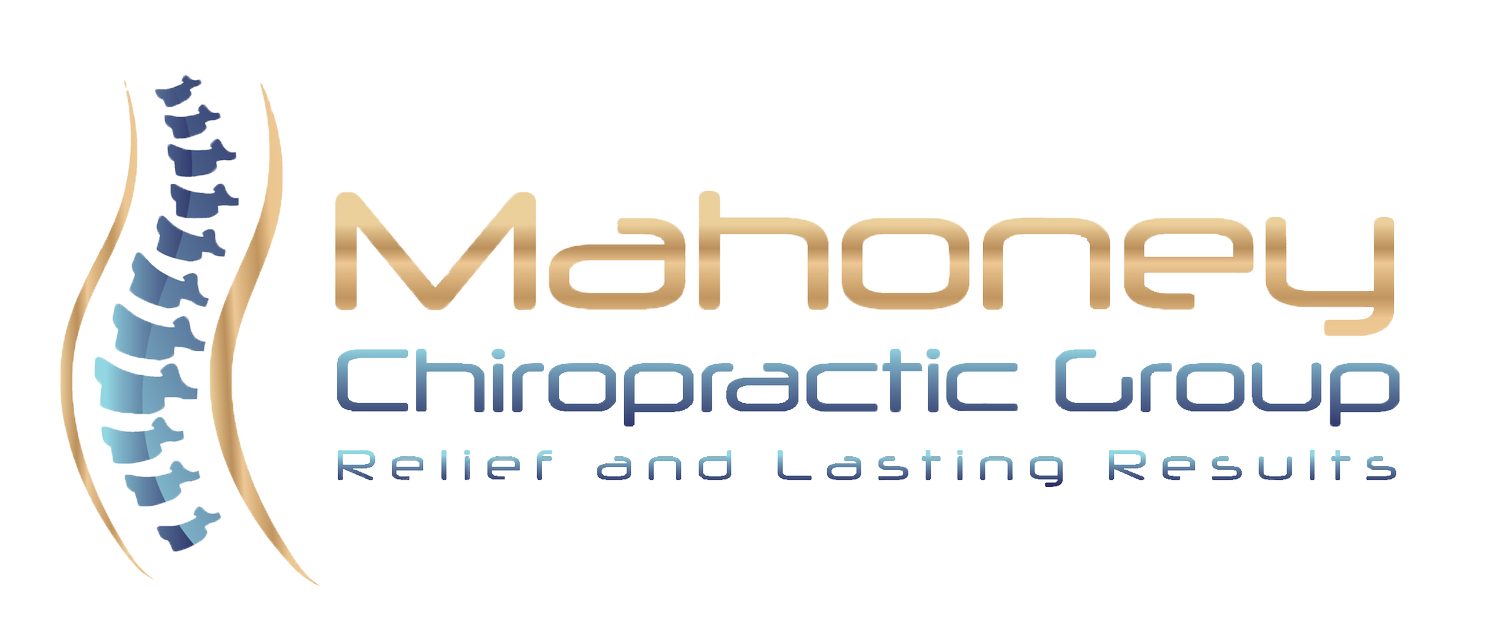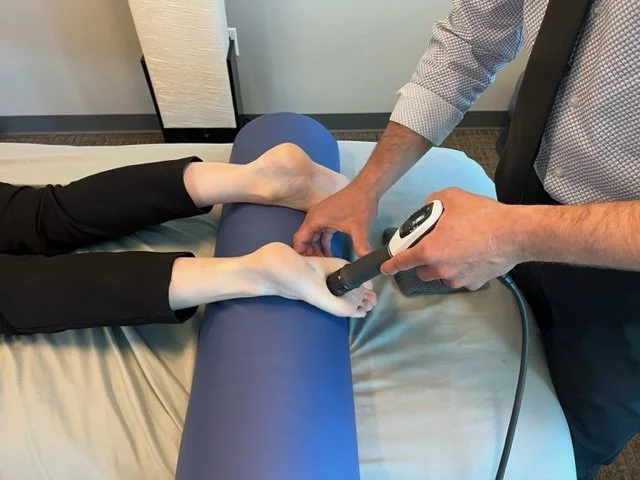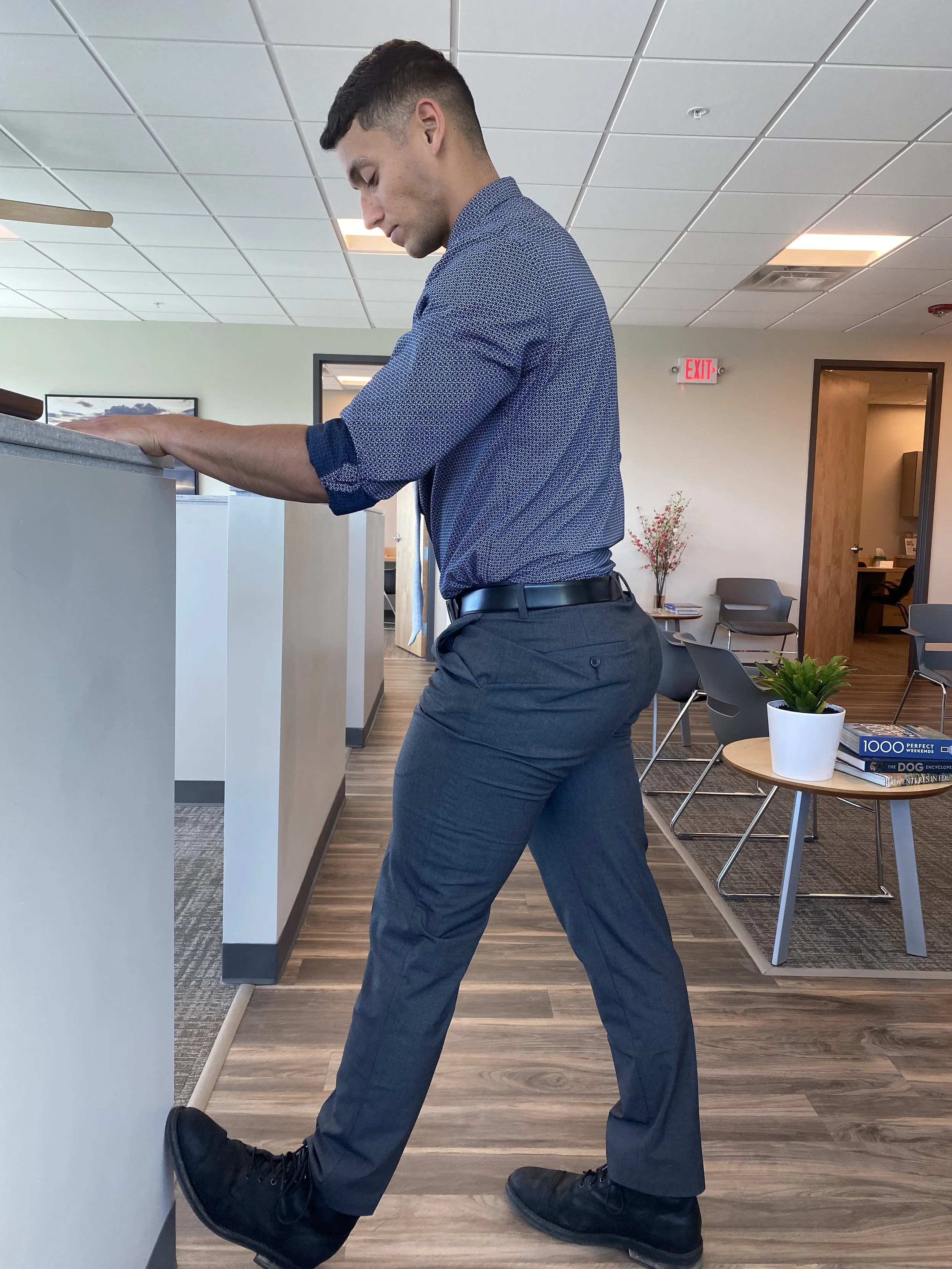Plantar Fasciitis Treatment - Colchester, VT
Shockwave therapy being used to treat plantar fasciitis.
Plantar Fasciitis Treatment in Colchester, VT – By Mahoney Chiropractic Group
In this post, we’ll cover:
Understanding Plantar Fasciitis
Brief Anatomy of the Foot
Causes & Predisposing Factors of Plantar Fasciitis
Treatment Options for Plantar Fasciitis
Our Comprehensive Plantar Fasciitis Treatment in Colchester
Benefits of Our Non-Invasive Plantar Fasciitis Treatment
At-home Tips for Plantar Fasciitis
Plantar Fasciitis FAQ’s
Understanding Plantar Fasciitis
Plantar fasciitis is a common cause of heel pain, often making the first steps in the morning very painful.
Plantar fasciitis occurs when the plantar fascia, a tough band of tissue that runs along the sole of your foot, is overloaded or overstretched and becomes irritated, creating pain. The plantar fascia is essential in supporting the arch of your foot and providing shock absorption, and plays a vital role in walking. Tight calves and Achilles tendons are often major contributors to this condition, as these structures connect to the plantar fascia and can pull on it excessively.
At Mahoney Chiropractic Group in Colchester, Vermont, we understand how disruptive this condition can be, and we offer effective, non-surgical solutions to help you find lasting relief.
Brief Anatomy of the Foot & the Structures Affected by Plantar Fasciitis
Foot anatomy showing affected regions during Plantar Fasciitis
Plantar Fascia- band of connective tissue that connects from the heel bone to the base of the toes (metatarsals)
Calcaneus (Heel Bone)
Metatarsals
Talus
Achilles Tendon
Causes & Predisposing Factors of Plantar Fasciitis
While heel spurs are sometimes associated with plantar fasciitis, they are rarely the cause of the pain. Plantar fasciitis is most commonly caused by overuse injury due to repetitive strain, which causes micro-tears of the fascia.
However, plantar fasciitis is often caused by multiple factors.
Pre-disposing Factors of Plantar Fasciitis:
Overuse Stresses
Muscle imbalances (often originating in the pelvis) - tight Achilles tendon, gastrocnemius, soleus muscles
Foot Arch Problems- high arch or flat feet
Ankle Dysfunction
Sudden Change in Activity Level
Excess Weight
Prolonged Standing
Improper Shoes- inadequate arch support or soft soles (ex. Crocs)
Over-pronation (excessive inward rolling of the foot) or over-supination (excessive outward rolling of the foot)
Treatment Options for Plantar Fasciitis
Rest
Ice
Stretching of tight muscles in feet and calves
Night Splints
Nonsteroidal Anti-Inflammatory Medication
Orthotics
Chiropractic Care
Physical Therapy
Shockwave Therapy
Botox Injections
Steroid Injections
In severe cases with no response to conservative care: Surgery
Our Comprehensive Plantar Fasciitis Treatment in Colchester
At Mahoney Chiropractic Group, our chiropractors take a comprehensive, multi-pronged approach to plantar fasciitis treatment, combining chiropractic care with advanced therapies to address the root cause of your pain. Schedule here for a consult
Our Effective Plantar Fasciitis Treatment Includes:
Exercises and Stretching
Recommendations on Proper Footwear and At-home Care for the Fastest Recovery
Chiropractic Adjustments: Chiropractic adjustments address pelvic imbalances, which are often a key contributing factor to muscle imbalances and plantar fasciitis. In addition to adjusting the spine and pelvis we address dysfunction in the hip, knee and ankle. Correcting these imbalances improves biomechanics and reduces strain on the plantar fascia.
Shockwave Therapy: Shockwave therapy is a highly effective treatment for plantar fasciitis. Shockwave therapy consists of high-energy sound waves that stimulate the body’s natural healing processes. This non-invasive therapy relieves pain, increases blood flow, encourages the regeneration of damaged tissues, the formation of new blood vessels, and decreases the thickness of the plantar fascia (part of the healing process).
Class IV Laser Therapy: Class IV laser therapy delivers specific wavelengths of light to the injured tissue. This light energy promotes tissue repair, reduces inflammation, and accelerates healing. Class IV Laser therapy is a powerful tool in managing plantar fasciitis pain and promoting long-term recovery.
Benefits of Our Non-Invasive Plantar Fasciitis Treatment
Significant Pain Relief: Our combination of chiropractic adjustments, Shockwave Therapy, and Class 4 Laser Therapy can effectively reduce the Plantar Fasciitis pain.
Restored Mobility: We focus on gently restoring your foot’s range of motion so you can comfortably resume your daily activities.
Personalized Care: Your treatment plan is tailored to your unique needs, ensuring the most effective and targeted approach.
Accelerated Recovery: Our integrated chiropractic approach is designed to help you recover more quickly and get back to your normal life.
At-Home Tips for Plantar Fasciitis
Choose Good Footwear- Wearing supportive shoes is crucial for managing plantar fasciitis. Look for shoes with good arch support and a cushioned sole. Avoid prolonged use of shoes that are too flat or too high.
Stretch Your Calf Muscles
Figure 4 on the Floor (picture below on the left): Focus on bringing your toes/foot back towards your body. If you bring your body closer to your leg, it will be more of a hamstring stretch
Toe on Wall (picture below on right): Put the toes of your painful foot up on the wall and bring your body forward until you start to feel the calf stretch.
Frozen Water Bottle: Place a frozen water bottle under the bottom of your foot and roll your foot back and forth.
Call our office for a consult with one of our best chiropractors in Colchester, VT
Plantar Fasciitis FAQs
Who is the best person to see to treat plantar fasciitis? A chiropractor who offers a combination of adjustments, soft tissue therapy, shockwave therapy, and laser therapy, along with exercises & stretches is who we recommend.
How do I know I have plantar fasciitis? Heel pain that is worse in the morning or after rest is the most common sign.
What is the best treatment for plantar fasciitis? A combination of professional treatments like shockwave and laser therapy, along with consistent home care (stretching, icing, supportive shoes) and chiropractic adjustments for the foot, offers the best chance for rapid healing.
Is it worth seeing a physical therapist for plantar fasciitis? Yes, physical therapy can help provide exercises and stretches. A combined approach with chiropractic care is often most effective.
What is the number one cause of plantar fasciitis? Repetitive strain due to overuse.
What’s the worst thing you can do for plantar fasciitis? Ignoring the pain and not seeking treatment can make the condition worse and more difficult to treat later on.
How many treatments are needed for plantar fasciitis to get better? The number of treatments varies depending on the severity and duration of your condition. After in an in-depth consultation, we will develop a personalized treatment plan for you.
How to cure plantar fasciitis at home? While home care is important, professional treatment is often necessary for quicker and lasting relief. Home care includes stretching, icing, supportive shoes, and self-massage.
Regain Your Mobility Today
Don't let plantar fasciitis keep you inside this summer! Mahoney Chiropractic Group in Colchester understands your pain and is dedicated to providing effective, lasting relief. Our experiences team is ready to help you get back on your feet and enjoy an active summer. Contact us for a consultation or you can book online: Schedule your Consultation Today














